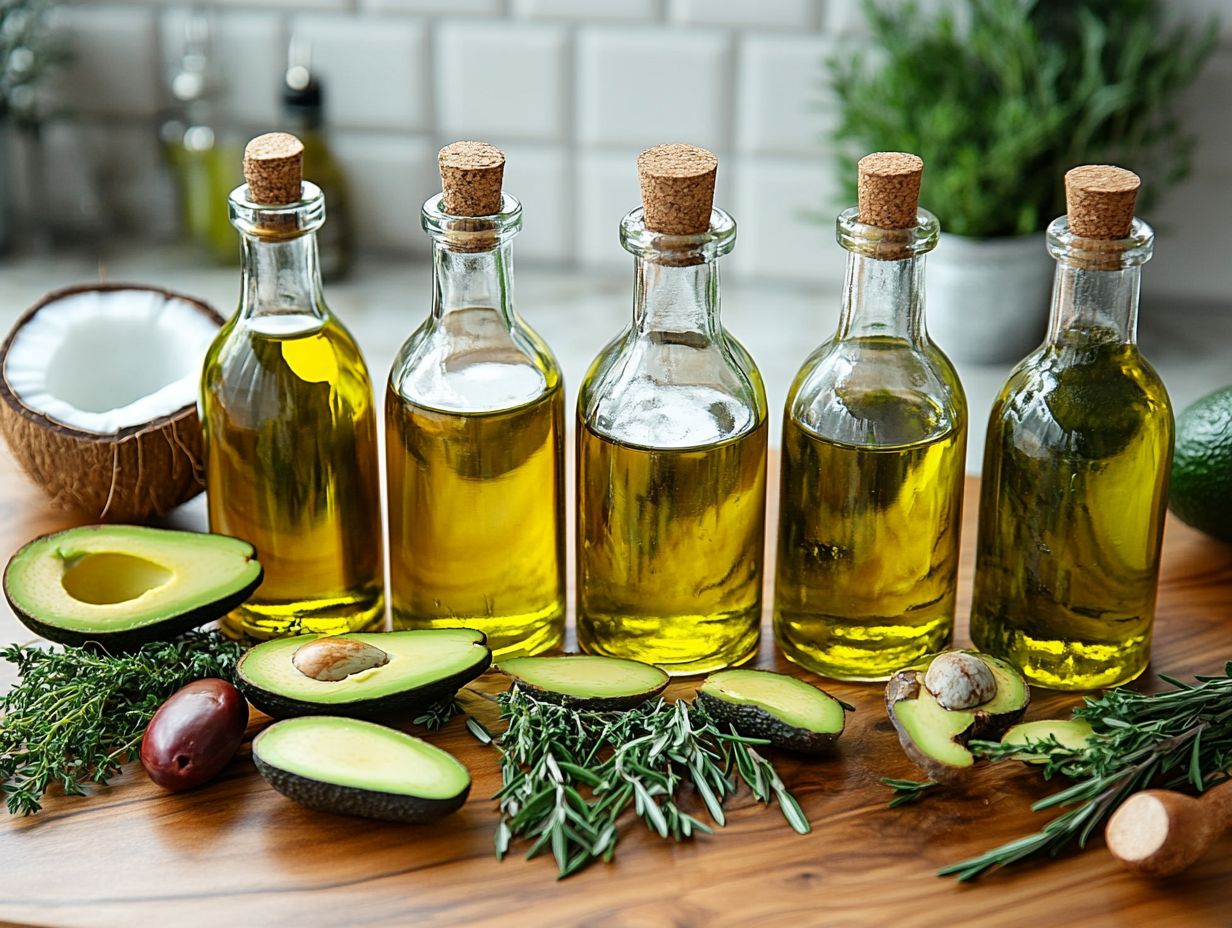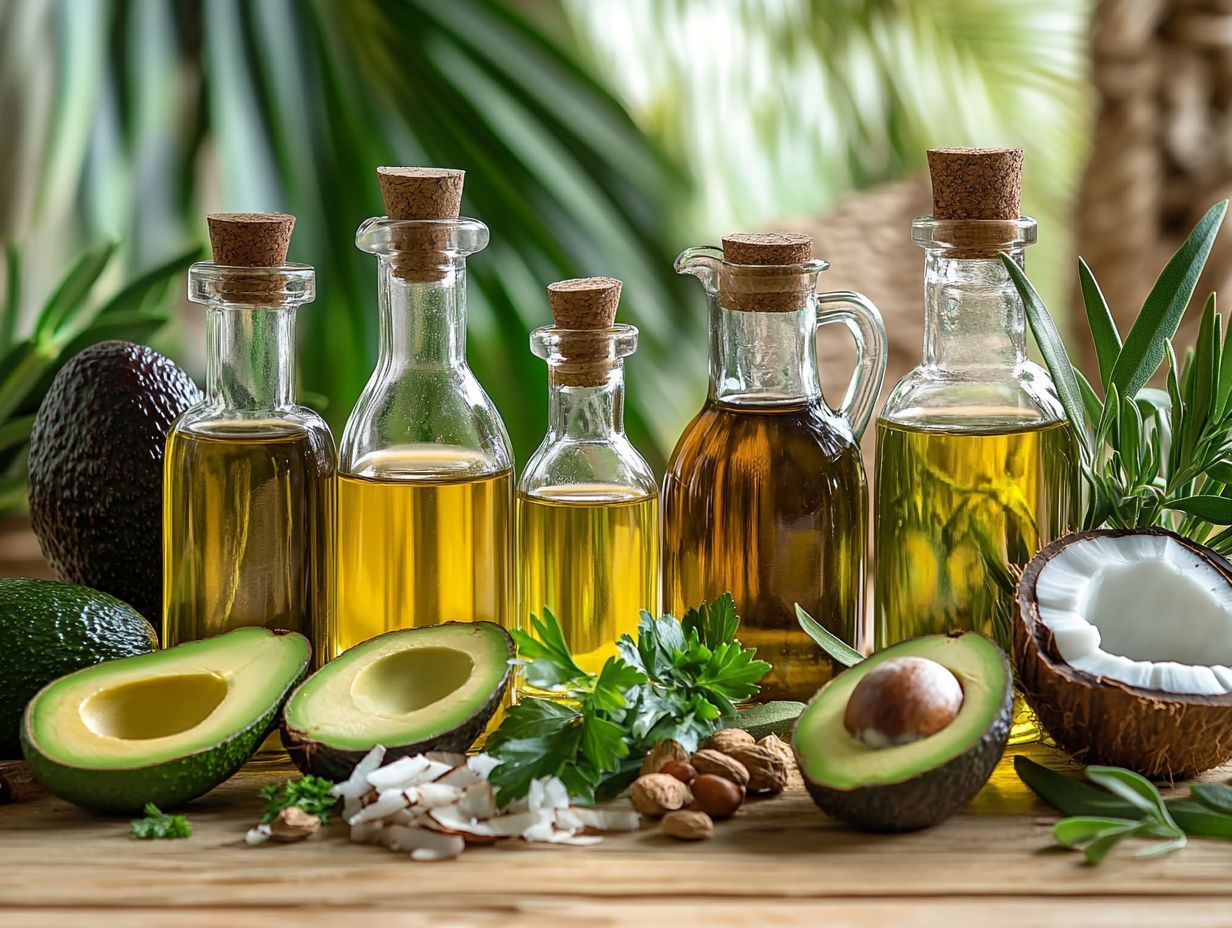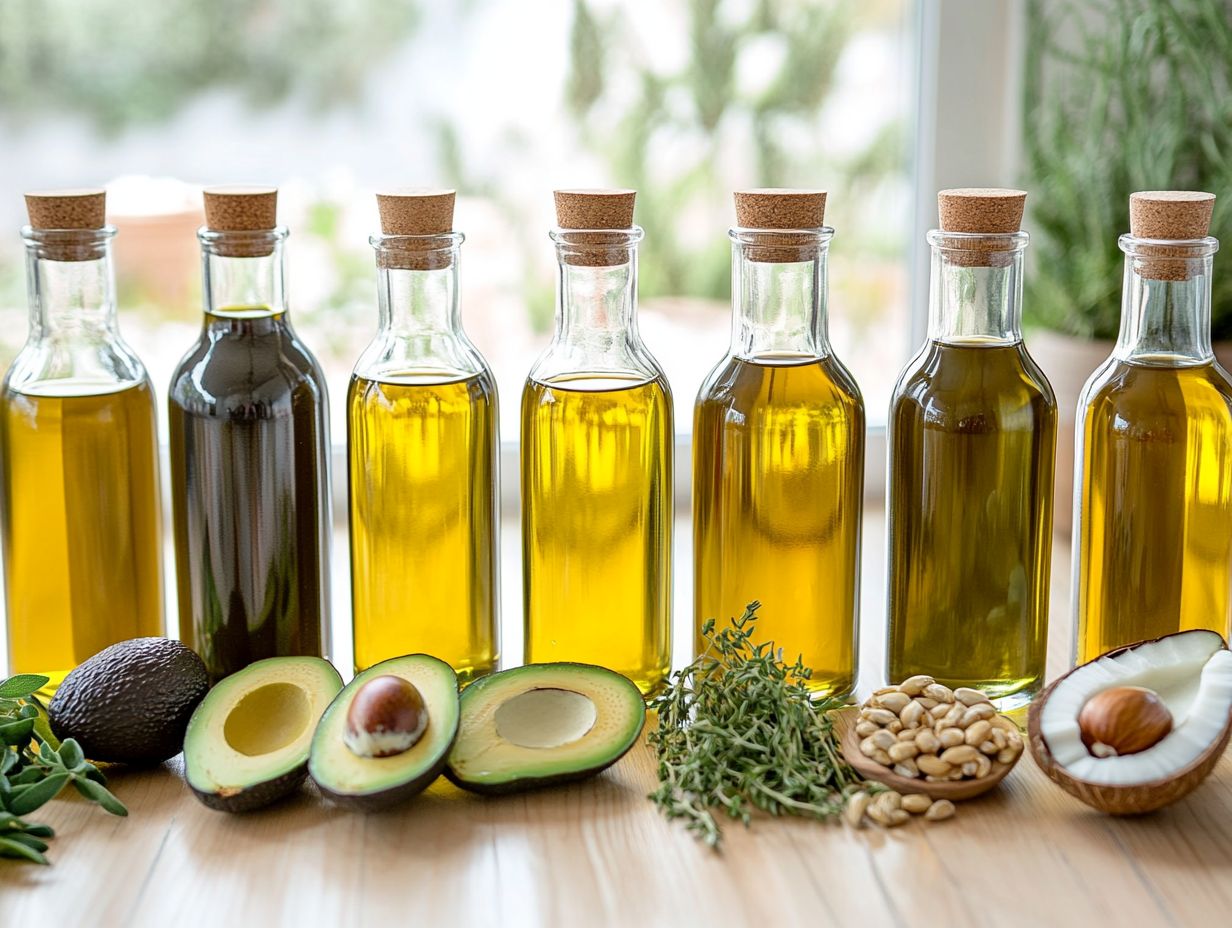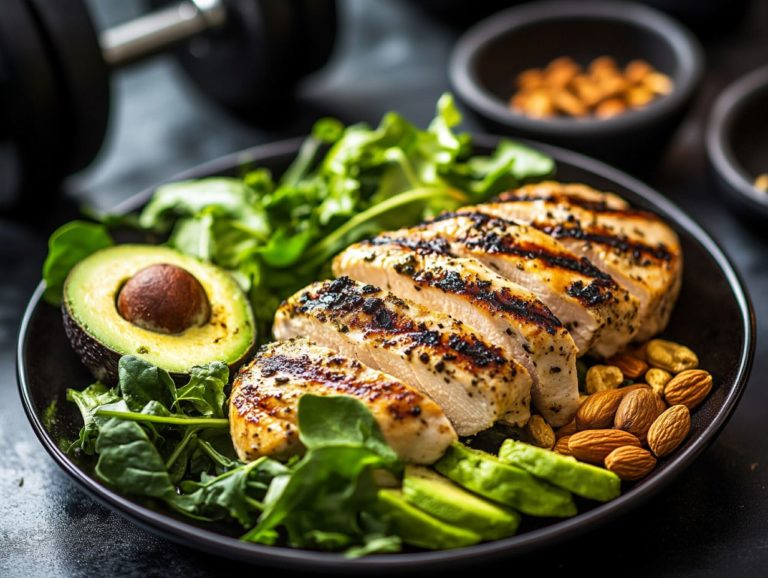What are Keto-Friendly Oils? Your Questions
In the realm of ketogenic diets, the types of fats you choose are pivotal. They can help you reach your health objectives.
What qualifies as keto-friendly oils? These oils can elevate your keto journey.
Keto oils promote weight loss and support heart health. They offer advantages aligned with your wellness goals.
Explore what makes an oil keto-friendly. Discover standout options like coconut, avocado, and red palm oil.
Embrace the power of healthy fats. Elevate your keto experience to new heights!
Contents
- What Are Keto-Friendly Oils?
- What Are the Benefits of Keto-Friendly Oils?
- 2. Increases Energy Levels
- 3. Supports Heart Health
- What Makes an Oil Keto-Friendly?
- 1. High in Healthy Fats
- What Are Some Examples of Keto-Friendly Oils?
- How Can You Incorporate Keto-Friendly Oils into Your Diet?
- 1. Use as a Cooking Oil
- 2. Add to Salad Dressings
- 3. Use as a Dip for Vegetables
- 4. Make Homemade Mayonnaise
- Frequently Asked Questions
- What are Keto-Friendly Oils?
- What makes an oil keto-friendly?
- Can I use any type of oil on a keto diet?
- What are some examples of keto-friendly oils?
- Can I cook with keto-friendly oils?
- Are all keto-friendly oils healthy?
Key Takeaways:
- Keto-friendly oils are high in healthy fats and low in carbohydrates.
- They can promote weight loss and increase energy levels.
- Examples include coconut, olive, avocado, and MCT oil.
What Are Keto-Friendly Oils?
Keto-friendly oils are important partners in your keto journey. They serve as essential carriers of healthy fats that not only support your diet goals but also elevate your culinary endeavors. Including keto-friendly foods like these oils can help you adhere to your dietary goals.
Oils like extra virgin olive oil, coconut oil, MCT oil, and macadamia oil deliver the high-fat cooking solutions vital for thriving on a low-carb lifestyle. Rich in heart-healthy fats, these oils seamlessly integrate into a myriad of keto recipes and meals, making them essential for anyone eager to embrace or sustain a keto lifestyle.
What Are the Benefits of Keto-Friendly Oils?
The benefits of keto-friendly oils provide advantages that extend beyond culinary enjoyment. They enhance overall health and well-being for anyone adhering to a keto diet. These oils, brimming with healthy fats, have demonstrated their ability to promote weight loss, elevate energy levels, and support heart health, making them critical in a low-carb lifestyle.
By integrating oils such as coconut oil and extra virgin olive oil into your diet, you open the door to a wealth of health benefits that seamlessly complement your keto-friendly cooking and eating practices.
1. Promotes Weight Loss
One of the most significant benefits of keto-friendly oils lies in their remarkable ability to promote effective weight loss. By integrating healthy fats like coconut oil and MCT oil into your diet, you can enhance your sense of satiety and curb cravings, making it easier for you to stick to a low-carb lifestyle and reach your weight loss goals.
These oils not only elevate the flavors of your meals but also play a crucial role in managing your hunger. Healthy fats stimulate the release of hormones that signal fullness, helping you fend off those pesky hunger pangs. Including them in your keto desserts can also help satisfy sweet cravings without derailing your diet.
For example, drizzling avocado oil over a fresh salad or incorporating olive oil into a savory vegetable stir-fry can extend your satisfaction and keep you feeling fuller for longer. Plus, these oils can rev up your metabolic rate, assisting your body in burning fat more efficiently.
By thoughtfully incorporating a variety of these healthy fats into your keto recipes, you can enjoy delicious meals while seamlessly supporting your weight loss journey.
Start incorporating these oils today and feel the difference!
2. Increases Energy Levels
Keto-friendly oils, especially MCT oil, are known for their impressive ability to boost energy levels for those on a keto diet. They provide a quick energy source that your body can easily convert into ketones. This helps you maintain steady energy throughout the day without the crash that often comes with high-carb snacks. Therefore, they are excellent energy sources for keto cooking oils and meals.
This quick conversion is why many people report greater endurance and mental clarity, even during tough workouts or demanding tasks. For instance, a friend who adopted the keto lifestyle found that adding MCT oil to her morning smoothie gave her consistent energy that lasted through her busy workdays.
Scientific research supports these personal experiences, showing that MCT oil can significantly enhance athletic performance by increasing ketone production. Nutrition experts often point out that diets rich in these oils can help burn fat, leading to improved stamina and overall vitality.
This perspective resonates with many people looking for dependable energy sources without the ups and downs often linked to traditional carbohydrates.
3. Supports Heart Health
Incorporating keto-friendly oils like extra virgin olive oil and macadamia oil into your diet can greatly improve your heart health. These oils are full of healthy fats that lower bad cholesterol and raise good cholesterol, ultimately reducing your risk of heart disease.
Numerous studies highlight the benefits of these oils, particularly their high levels of monounsaturated fats and antioxidants. For example, extra virgin olive oil is shown to lower LDL cholesterol and inflammation two key factors in heart issues. A study in the Journal of the American College of Cardiology found that diets rich in olive oil can significantly lower heart attack risk.
Similarly, macadamia oil, which contains beneficial fatty acids like palmitoleic acid, has been linked to better cholesterol levels. Experts stress that regularly adding these oils to your meals nourishes your body and plays an essential role in keeping your heart healthy. Including these oils can transform your heart-healthy eating plan.
What Makes an Oil Keto-Friendly?
An oil is considered keto-friendly mainly based on its makeup, which should be rich in healthy fats and low in carbohydrates. Oils high in medium-chain triglycerides (MCTs) are particularly beneficial for those following a keto diet.
This is because MCTs are a type of fat that the body uses quickly for energy while effectively supporting ketosis.
1. High in Healthy Fats

Keto-friendly oils are known for their high levels of healthy fats, essential for anyone following a low-carb lifestyle. Oils like avocado oil and high-oleic sunflower oil provide vital fatty acids and fuel your body s energy needs when carbs are low.
These oils offer benefits that go beyond energy; they are packed with nutrients that can boost heart health and reduce inflammation. For example, olive oil is rich in monounsaturated fats and supports cardiovascular health. Coconut oil, loaded with medium-chain triglycerides (MCTs), can also enhance ketone production, effectively aiding your ketogenic journey. Walnut and flaxseed oil are also great sources of omega-3 fatty acids, which are crucial for cognitive function and overall well-being.
By adding these healthy fats to your meals, you enhance the flavor and ensure a balanced intake of dietary fats, reinforcing the core principles of a sustainable keto diet.
2. Low in Carbohydrates
For an oil to qualify as keto-friendly, it must be low in carbohydrates, ensuring it aligns with your ketogenic diet. Oils like refined coconut oil and sesame oil meet this criterion perfectly, allowing you to enjoy delicious dishes while staying within your daily carb limits.
When it comes to keto cooking, choosing the right oils is essential for keeping your body in a state of ketosis. Oils such as avocado, macadamia nut, and olive oil not only have low carbohydrate counts but also provide healthy fats that can enhance satiety and support your overall health.
Incorporating these oils into your meals is a breeze simply drizzle olive oil over roasted vegetables, use avocado oil for saut ing your favorite proteins, or elevate your dressings with a splash of sesame oil for a delightful flavor twist.
By thoughtfully selecting low-carb oils, you ll sail through the challenges of a ketogenic lifestyle while keeping your meals vibrant and satisfying. Renowned olive oil companies like California Olive Ranch, Kirkland Organic, Cobram Estate, Lucini, Lucero, and McEvoy Ranch Organic offer excellent options for those looking to incorporate high-quality keto-friendly oils into their diet.
3. Contains Medium-Chain Triglycerides (MCTs)
Medium-chain triglycerides (MCTs) are a special kind of saturated fat found in certain keto-friendly oils, offering a wealth of health benefits. MCT oil, in particular, has become a favorite within the keto community due to its remarkable ability to elevate energy levels and accelerate fat burning. This makes it an essential ingredient in many keto recipes. Experts like Dr. Stephen Phinney have extensively studied the benefits of MCTs and their role in the keto diet.
These fats are metabolized differently than their long-chain counterparts, allowing your body to swiftly convert them into ketones. This conversion provides a highly efficient energy source, particularly advantageous for those embracing a ketogenic lifestyle. By incorporating MCTs into your diet, you can support weight management and enjoy enhancements in cognitive function while benefiting from their anti-inflammatory properties.
Balancing MCTs with other healthy fats like omega-6 fatty acids from sources like high-oleic sunflower oil ensures a well-rounded nutritional intake. Primarily extracted from coconut oil and palm kernel oil, MCTs can also be found in certain dairy products and used in supplements like those recommended by Dr. Stephen Phinney.
For practical use, you can easily add MCT oil to your smoothies, coffee, or salad dressings. This seamless integration enhances not only the nutrition of your meals but also their flavor, elevating your culinary experience.
What Are Some Examples of Keto-Friendly Oils?
- Coconut oil
- Olive oil
- Avocado oil
- MCT oil
- Flaxseed oil
Each of these oils presents distinct health benefits and culinary versatility, making them essential components in a diverse array of keto recipes and meals.
1. Coconut Oil
Coconut oil has become a favored choice among keto enthusiasts, and it s easy to see why. With its impressive saturated fat content and a host of health benefits, it stands out in the realm of cooking oils. The secret lies in its unique composition, which is abundant in medium-chain triglycerides (MCTs). This makes it an exceptional option for high-fat recipes that not only enhance flavor but also elevate nutritional value.
By incorporating coconut oil into your meals, you can significantly boost your energy levels and support weight management, aligning seamlessly with your ketogenic lifestyle. Imagine using it as a base for saut ing vegetables or frying eggs, imparting a delightful tropical flavor that transforms even the simplest dishes.
You can also blend it into smoothies for a luscious, creamy texture or drizzle it over popcorn for a healthier snack that satisfies your cravings. You have to try out a coconut oil-infused bulletproof coffee: just blend brewed coffee with coconut oil and unsalted butter for a rich, satisfying beverage that keeps you energized throughout the day.
2. Olive Oil
Olive oil, especially extra virgin olive oil, is a treasure in the culinary world. It is celebrated for its heart-healthy fats and remarkable versatility.
Packed with antioxidants and healthy monounsaturated fats, this keto-friendly oil is your go-to for everything from zesty salad dressings to a drizzle over your favorite dishes, or even for high-fat cooking methods. Brands like Kirkland Organic, Cobram Estate, and Lucero offer exceptional quality that can elevate your culinary creations.
Incorporating olive oil into your ketogenic diet not only boosts the flavor of your meals but also provides essential nutrients that support your overall well-being. It s a fantastic source of anti-inflammatory properties and can help promote healthy cholesterol levels, making it a great option for anyone wanting to eat balanced meals.
Whether you use it as a base for marinades, a finishing touch for roasted veggies, or mix it into creamy dips, the versatility of olive oil makes it an essential staple in any health-conscious kitchen.
3. Avocado Oil
Avocado oil stands out as an exceptional keto-friendly oil, celebrated for its impressive smoke point and robust nutritional benefits. Rich in healthy fats, this oil not only elevates the flavors of your dishes but also supports heart health, positioning it as a must-have for high-fat cooking.
Its versatility is a game changer, allowing you to use it in a myriad of culinary applications from saut ing and roasting to drizzling over fresh salads or blending into smoothies. By incorporating avocado oil into your keto diet, you enhance the nutritional value of your meals with essential omega-3 and monounsaturated fats. Omega-3s are a type of essential fat that your body needs but cannot produce itself.
Consider using it as a foundation for salad dressings or marinades, or even as a substitute for butter in low-carb baking recipes. This oil harmonizes beautifully with various seasonings, amplifying both the taste and health benefits of your everyday dishes.
With all these advantages, avocado oil is an amazing addition that every keto kitchen should have!
4. MCT Oil

MCT oil stands out as a powerhouse among keto-friendly oils, renowned for its remarkable ability to provide an instant energy boost while supporting ketosis. Its concentrated form of medium-chain triglycerides (MCTs) has made it a go-to choice for fitness enthusiasts and anyone embracing a ketogenic diet. MCTs are a type of fat that your body can use quickly for energy.
MCT oil is not just about a quick energy fix; it also offers a wealth of benefits that can enhance your overall health. It plays a crucial role in fatty acid metabolism, making it an ideal option for those looking to shed a few pounds or maintain energy levels during demanding workouts.
Incorporating MCT oil into your daily meals is a breeze. You can drizzle it over salads, blend it into smoothies, or stir it into your coffee for a creamy texture that elevates your morning routine.
For those committed to a keto lifestyle, this oil not only promotes sustained energy without the need for carbs but also aids in curbing appetite, making it easier to adhere to your dietary goals. To truly maximize its benefits, it’s wise to start with small amounts and gradually increase your intake, seamlessly integrating it into various dishes for a nutritious, fat-fueled day.
5. Flaxseed Oil
Flaxseed oil is an exceptional addition to your keto-friendly pantry, offering a rich source of omega-3 fatty acids. This oil brings a host of health benefits, including anti-inflammatory properties and support for heart health, making it a valuable choice for low-carb diets.
Incorporating flaxseed oil into your daily meals can enhance your overall wellness while aligning perfectly with the nutritional goals of a ketogenic lifestyle. Packed with lignans and fiber, flaxseed oil helps maintain a balanced gut microbiome, promoting digestive health.
You can effortlessly integrate it into various recipes, whether it s salad dressings, smoothies, or drizzling it over roasted vegetables. For breakfast, think about mixing it into chia pudding or keto-friendly oatmeal to provide both flavor and a healthy fat boost.
By including flaxseed oil in your meal planning, you can experience improved energy levels and sustained satiety throughout the day, making your keto journey even more rewarding.
Start incorporating these oils into your meals today and enjoy the health benefits they bring!
How Can You Incorporate Keto-Friendly Oils into Your Diet?
Keto-friendly oils offer numerous health benefits, making them an essential addition to your dietary choices. Incorporating these oils into your meals is not only simple but also incredibly versatile, enabling you to elevate both the flavor and health benefits of your dishes.
Whether you use them as a cooking oil, mix them into your salad dressings, or blend them into homemade mayonnaise, these oils can easily integrate into your daily routine. They enrich your keto meals with essential healthy fats.
1. Use as a Cooking Oil
Using keto-friendly oils as your go-to cooking oil is one of the simplest ways to infuse healthy fats into your meals. Oils like coconut oil and avocado oil are perfect for saut ing or frying, allowing you to create delicious, nutritious dishes without straying from your dietary goals.
These versatile oils also work wonders in baking, making them ideal for low-carb recipes like muffins or almond flour cookies. You can enhance your keto baking with products from Dr. Stephen Phinney. When saut ing vegetables, a drizzle of garlic-infused olive oil not only boosts flavor but also aligns with keto principles.
Frying your favorite protein, such as chicken wings in avocado oil, results in a crispy, mouthwatering delight. Don t forget to consider your oil choices for baking; for example, melted coconut oil can work wonders in crafting moist, decadent brownies.
By incorporating these cooking methods and oils, you can indulge in delectable meals while staying true to a low-carb lifestyle.
2. Add to Salad Dressings
Keto-friendly oils can enhance your salad dressings, elevating both flavor and nutrition. Take extra virgin olive oil, for example it’s a stellar base for dressings, providing a rich source of heart-healthy fats while beautifully complementing a range of salads.
To create dressings that excite the palate, blend olive oil with fresh lemon juice, Dijon mustard, and aromatic herbs. These additions can transform any green mix into something truly special.
Don t overlook avocado oil either. Its mild flavor and high smoke point make it perfect for creamy dressings. By mixing avocado oil with zesty lime juice, fresh cilantro, and a hint of garlic, you can create a vibrant dressing that will elevate your salads to a whole new level!
If you’re feeling adventurous, sesame oil can introduce an Asian twist when combined with rice vinegar and soy sauce, turning simple greens into a delectable side dish.
With these versatile combinations, you can effortlessly transform ordinary meals into nourishing delights through your keto-friendly salad dressings.
3. Use as a Dip for Vegetables
Keto-friendly oils can turn your vegetable snacks into a healthy and satisfying experience when used as dips. By combining oils like avocado oil or MCT oil with an array of herbs and spices, you can create delightful dips that perfectly complement your veggie platter.
Imagine a vibrant dip made from a simple blend of avocado oil, fresh cilantro, lime juice, and garlic. This combination enhances the flavors of crunchy bell peppers and radishes in a truly delightful way, much like the high-quality oils from Kirkland Organic and California Olive Ranch.
You can also mix MCT oil from reputable brands like Lucini or Lucero with tahini, lemon zest, and cumin to create a creamy, zesty dip that pairs beautifully with celery sticks and cucumber slices.
Don’t hesitate to experiment with various oils and spices to discover unique flavor profiles that cater to your palate. These flavorful dips not only elevate your vegetable snacking experience but also keep your keto lifestyle enjoyable and exciting, as advocated by keto experts like Dr. Stephen Phinney.
In summary, incorporating keto-friendly oils into your diet can greatly enhance the flavor and health benefits of your meals. Don’t miss out on the flavor explosion these oils can bring to your dishes!
4. Make Homemade Mayonnaise
Making homemade mayonnaise is an exceptional way for you to add keto-friendly oils to your meals while indulging in a delightful condiment. By using oils like avocado oil, extra virgin olive oil, or even MCT oil, you can whip up a creamy mayonnaise that beautifully enhances your favorite dishes.
This simple recipe lets you control the ingredients. Start by gathering a few essential ingredients: egg yolks, mustard, vinegar or lemon juice, and your chosen keto-friendly oil. With a blender or whisk, mix these ingredients together until they blend into a smooth and creamy consistency that far surpasses anything you ll find in a store.
Get creative and have fun in the kitchen! Experimenting with herbs, garlic, or spices can lead to delicious variations, like a creamy garlic aioli or a zesty herb-infused mayonnaise. This way, you can add a personalized touch to your culinary creations that truly reflects your taste.
Frequently Asked Questions

What are Keto-Friendly Oils?
Keto-friendly oils are oils that are suitable for consumption on a ketogenic diet. These oils are high in healthy fats and low in carbohydrates, making them ideal for maintaining a state of ketosis.
What makes an oil keto-friendly?
An oil is considered keto-friendly when it has a high proportion of monounsaturated and polyunsaturated fats and a low proportion of saturated fats. It should also have minimal amounts of carbohydrates, ideally less than 1 gram per serving.
Can I use any type of oil on a keto diet?
No. While many types of oil can be consumed on a keto diet, some are not suitable due to their high carb and/or saturated fat content. It is important to read labels and choose oils that are specifically labeled as keto-friendly.
What are some examples of keto-friendly oils?
Some examples of keto-friendly oils include avocado oil, coconut oil, olive oil, and MCT oil. Other options include flaxseed oil, walnut oil, and macadamia nut oil.
Can I cook with keto-friendly oils?
Yes, cooking with keto-friendly oils is not only allowed, but recommended. These oils have high smoke points and are stable at high temperatures, making them suitable for cooking methods such as frying and saut ing.
Are all keto-friendly oils healthy?
While keto-friendly oils are suitable for consumption on a ketogenic diet, it is important to remember that they are still high in calories and should be consumed in moderation. It is best to focus on getting healthy fats from a variety of sources, rather than relying solely on oils for fat intake.






